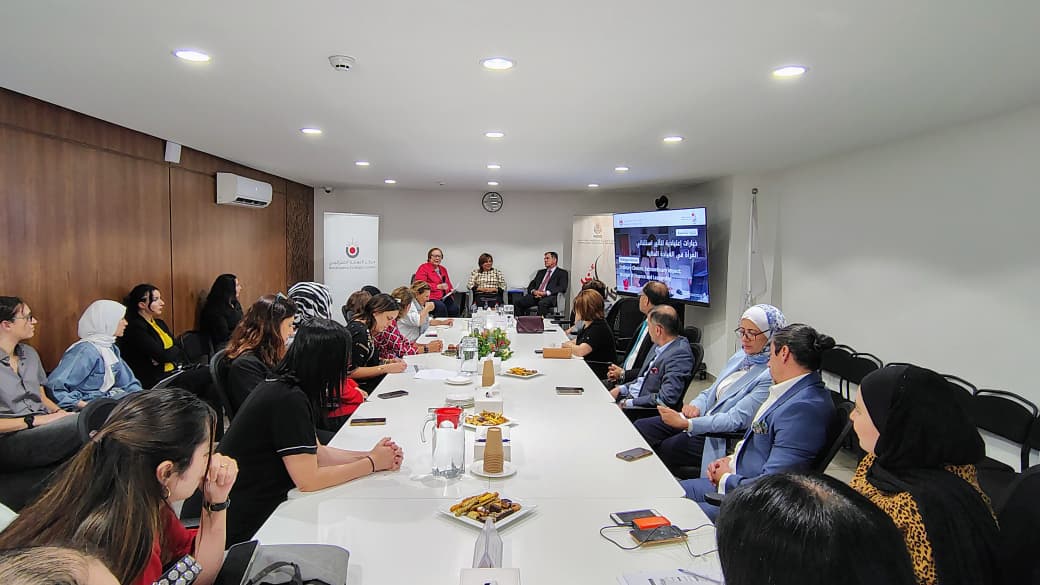At a time when the need for economic leaders capable of effecting change is growing, women are reaffirming that impact is not achieved through exception, but through continuity and awareness. With this in mind, the Renaissance Strategic Center, affiliated with the Renaissance Organization (ARDD), in partnership with the Renaissance Women’s Network, held a dialogue session titled “Ordinary Choices for Extraordinary Impact: Women in Financial Leadership” on Tuesday, October 7, 2025, to enhance financial awareness and literacy and support women’s presence in economic leadership positions.
During the session, which featured former Minister of Investment Kholoud Al-Saqqaf and economic expert Dr. Adly Kandah, along with a group of specialists and those interested in economic affairs and women’s empowerment, and was moderated by Dr. Sawsan Majali, the importance of empowering women in the fields of financial management and entrepreneurship was highlighted, as well as their growing role in achieving sustainable economic growth.
Dr. Majali emphasized that countries with a greater presence of women in leadership positions—such as Bahrain, the UAE, and Qatar—also achieve higher levels of financial inclusion, with women occupying approximately 30% of leadership positions worldwide.
For his part, Dr. Adly Qandah emphasized the importance of promoting financial literacy from an early age, explaining that Jordan began incorporating financial literacy into school curricula in 2015, from grades seven through twelve, in cooperation with the Central Bank and the Ministry of Education. The goal is to build financial literacy based on knowledge, skills, and responsible behavior.
He added that financial literacy must be scientific and skill-based, noting that the new generation must possess independent financial awareness. He noted that recent studies confirm that women often perform better in business management, due to their meticulous and organized approach to financial planning and decision-making.
Her Excellency Kholoud Al-Saqqaf emphasized that incorporating financial literacy into educational curricula is one of the most important steps taken by Jordan. She explained that there are ongoing challenges in public financial management, and that women constitute approximately 83% of those working in the banking sector, in addition to a prominent presence in the health and education sectors.
Al-Saqqaf explained that women’s limited access to leadership positions is due to a number of reasons, some of which are related to women themselves, others to society, stereotypes, customs, and traditions, in addition to the lack of specialized programs to develop female leaders.
In response to a question about the most important factors in her success, Al-Saqqaf explained that she “did not reach the position of Chairperson of the Social Security Investment Fund and Minister of Investment by chance. She is one of the women who set their goals in mind and strive to achieve them with steadfastness and competence. She is one of the few in Jordan and the Arab world who have a distinguished relationship with the world of numbers and economics, having held senior positions, the most prominent of which was Deputy Governor of the Central Bank of Jordan, as the first woman in the Arab region to hold this position. The values she was raised on – that a person’s value is in what he offers, not what he owns – motivated her to overcome challenges and achieve her ambition to lead one of the most important national financial institutions.
In her remarks, Samar Muharib, Executive Director of the Renaissance Organization (ARDD), emphasized that the session’s title, “Ordinary Choices for Extraordinary Impact,” reflects the reality of financial management in women’s daily lives, where financial leadership is practiced in the simple details of life. She highlighted the important role of civil society, local committees, and official institutions in spreading financial awareness and empowering women to pass this culture on to their children, thus enhancing long-term financial sustainability.
Finally, the participants concluded with a set of recommendations, most notably: developing the public sector and building the capacity of both women and men to reach leadership positions; investing in women’s capabilities and empowering them in financial and economic fields; highlighting women’s success stories; supporting oversight practices to enhance transparency; building professional networks that support women; and developing studies that highlight gaps, challenges, and future opportunities in financial leadership.



